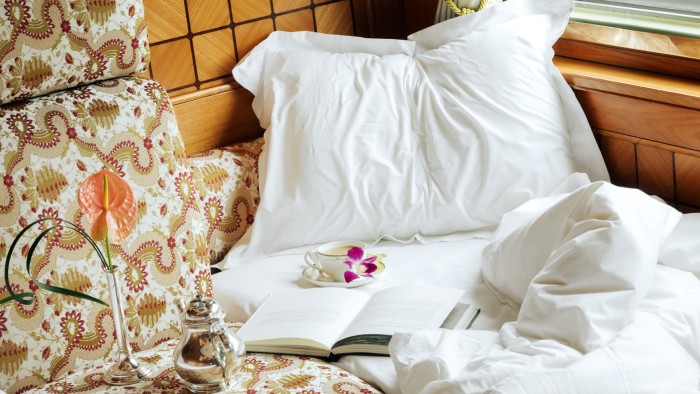Could a bespoke duvet transform your sleep?

Unlock the Editor’s Digest for free
Roula Khalaf, Editor of the FT, selects her favourite stories in this weekly newsletter.
A great-quality duvet is often the missing piece of the sleep puzzle,” says Nils Stene, third-generation CEO of Norvegr, which has been producing duvets in Norway since 1956. But, much as with mattresses, finding one that’s perfect for you isn’t easy.
“One of the most important things a good duvet can offer you is balance,” says Stene, whose company is one of a small number in the Nordic region specialising in handmade and custom-made down duvets. “If you are waking up too hot or too chilly in the night, you have the wrong one for your needs.”

Down derives not from feathers but the soft undercoat beneath the plumes of a duck or goose, growing in clusters of light fluffy filaments, which work as an insulator by trapping air. As a filling, it has a “cloud-like” appeal, adding warmth without weight. Stene advises buyers to “pay attention to fill power [the volume a fixed quantity of down will occupy]”. The EU fill power scale runs from 0-900, with most commercially available down duvets sitting at the lower end of the spectrum.
Eiderdown is a particularly luxurious form of duvet filling, as it is scarcer and softer than regular goose varieties (Norvegr offers both, from £931.56 for a double). It is also considered the most sustainable source of down, collected from the abandoned nests of eider ducks – as opposed to farms where the down of birds bred for meat and eggs (mostly in China) are gathered after slaughter. (The cruel practice of “live plucking” also accounts for around one per cent of the world’s supply of down, so it is always worth checking details.)

Only four tons of eiderdown is produced globally each year, with 75 per cent of the crop deriving from Iceland. Ragna Óskarsdóttir, founder and CEO of Icelandic Down, works closely with an eider-duck sanctuary in Loðmundarfjörður on the Eastfjords to harvest the supply for its duvets and comforters, which are all made to order (from £2,852). She oversees every purchase, and also runs the hotline.
Going bespoke is as much about fit as feel. Whether designed for round beds or to complement special mattresses aboard private yachts and aircraft (Norvegr supplies all of the bedding for Belmond’s hotels and some trains, for example), the latest trend is in dual-fill duvets for partners experiencing different sleeping temperatures. “Fighting over a duvet is a thing of the past,” says Stene of what is a real issue for many couples. It has long been the custom in Scandinavia to champion two separate duvets in the home, but for those who dare to share, “we can create two individual heat zones so that they are both happy”. The brand also puts its duvets together using channels instead of classic box-stitching and cross-seams, which allows for simple modifications on each side following a sleep consultation (offered free of charge).

Ava Innes is a more recent entrant to the market. Its bespoke combinations are offered alongside three ready-made togs (thermal overall grade) designed for summer, winter or year-round use. Founded in 2019 by textiles specialist Joan Johnston, the Scottish brand makes its duvets from a blend of cashmere guard (the long, straight hairs of the goat, often left discarded) and British wool, which travels fewer than 200 miles in the UK (a tree is also planted with every order to offset overall carbon footprint). The result is comparable to a weighted blanket. “It offers a more comforting, cocooning feel as you sleep,” says Johnston, who adds that the company uses a patented layering technique of its unique fibre to ensure there are no cool spots, and an even filling across the body (from £346).
She cites temperature regulation as a health benefit of cashmere guard (thought to be a by-product of its high keratin count): a study by the brand in 2023 found that 78 per cent of menopausal women reported improved sleep when using it as a duvet filling. Cashmere guard is also anti-microbial and moisture-wicking. “Our fibres are quite dry, which helps repel bedbugs and mites.” But to support maintenance, she also encourages airing out the duvet once a week, or folding it over once lengthwise before you make the bed to allow any residual moisture – both inside the mattress and duvet – to escape. Óskarsdóttir shakes out each handmade duvet, often in the crisp Icelandic air, before sending purchases off to customers.
Selecting breathable bedding to complement your duvet will also optimise your comfort. Egyptian cotton and linen are well suited to warm, temperate climates. The downside for some is linen’s propensity to wrinkle, although many happily embrace the aesthetic. A sewing company also handmakes each of Icelandic Down’s duvet shells from silks and cotton sateen.
“When considering a bespoke duvet a lot of people are driven by price, but you need to think that you spend about a third of your life in bed,” concludes Johnston. “A great night’s sleep keeps us going. If we wake up feeling fresh and ready to go, we can face all the challenges the world throws at us.”
Seven dreamy bed linens

Los Encajeros embroidered cotton Perlas king duvet cover, £650, abask.com

Bed Threads flax-linen duvet cover, from £120

Magniberg cotton patchwork Wall Street duvet cover, from €184

Joro linen duvet cover in forest green, from £210

Rebecca Udall cotton Annabelle bed linen, from £115

Tekla cotton Percale duvet cover, from £125

Frette cotton Basket Weave Embroidery pillowcase, £200
#bespoke #duvet #transform #sleep







